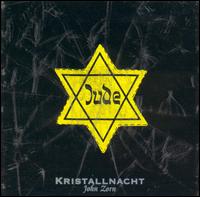| Kristallnacht | ||||
|---|---|---|---|---|
 | ||||
| Studio album by | ||||
| Released | 1993 | |||
| Recorded | November 9 & 10, 1992 | |||
| Genre | Avant-garde | |||
| Length | 42:44 | |||
| Label | Eva, Tzadik | |||
| Producer | John Zorn | |||
| John Zorn chronology | ||||
| ||||
Kristallnacht is the seventh studio album by John Zorn first released in 1993 on the Japanese Eva label and subsequently in 1995 on Zorn's own Tzadik Records label. [1]